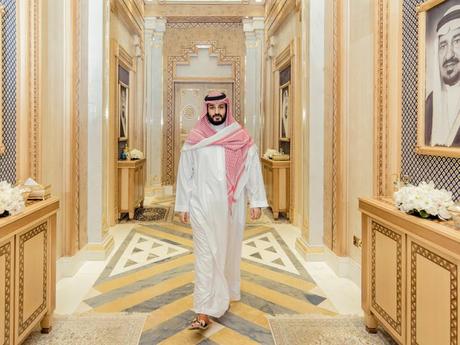 (Photo of Saudi Crown Prince Mohammed bin Salman, who likely ordered the murder of a journalist, is by Luca Locatelli in Time Magazine.)
(Photo of Saudi Crown Prince Mohammed bin Salman, who likely ordered the murder of a journalist, is by Luca Locatelli in Time Magazine.)The world was shocked last week by the murder of a Washington Post journalist by the Saudi Arabian government -- in the most obvious way (in their own embassy). But they shouldn't have been shocked. While the murder may have been the most obvious one by a government, it is far from the only one.
Journalists across the world are being attacked (and many murdered), and those attacks are growing in number. Even in the United States (supposed bastion of democracy), journalists are being threatened with death -- because Donald Trump has labeled them an "enemy of the people". I have to believe Trump's attack on journalists have encouraged less democratic governments to go after journalists they don't like.
This is a horrible trend, because democracy cannot exist in any country with a free and unfettered press. When journalists are threatened, attacked, imprisoned, and killed, it is nothing less than an attack on democracy itself.
The following is part of an excellent op-ed by Joel Simon in The Washington Post:
A record 262 journalists were jailed around the world at the end of last year, according to research by the Committee to Protect Journalists, the organization I lead. As the war in Syria has ebbed, the total number of journalists killed annually has come down from the low-to-mid 70s, but the number of murdered journalists has risen dramatically this year, to 27; there were 19 such deaths in all of 2016, and 18 last year. The suspects in the killings include criminal groups, terrorist organizations and governments. In about 90 percent of these cases, the perpetrators went unpunished
Powerful forces around the world recognize the threat posed by independent information and are determined to control it. In areas of Mexico dominated by drug cartels, critical reporting is all but impossible. The Islamic State systematically hunted down and killed anyone who defied its blanket censorship. Governments, including those in Egypt and China, fear popular demonstrations and so suppress reporting on corruption and malfeasance that could bring people into the streets. The crackdown is part of a broader global trend as Russia, North Korea and other authoritarian regimes have carried out extraterritorial attacks on their critics and faced only modest rebuke from the international community. Meanwhile, a legitimate concern with the spread of disinformation and misinformation online is empowering the censors, including governments putting pressure on Internet companies to remove critical content they don’t like. The crisis in press freedom is a threat to the global order. We live in the information age, yet the people who bring us news and information are being jailed, killed and censored at an unprecedented level. A decent respect for press freedom must be viewed as a guiding principle in international relations, a principle that cannot be sublimated to strategic considerations. . . . The United States, where respect for press freedom is enshrined in the First Amendment, has a key role to play. Support for press freedom has been a cornerstone of U.S. foreign policy with strong bipartisan support. . . . But one voice was largely missing until Wednesday. President Trump, who has cultivated a close relationship with the Saudi royal family, was slow to go beyond initially expressing “concern” before finally saying, on Wednesday, that “we cannot let this happen to reporters” and “we’re going to get to the bottom of it.” Better still would be an unequivocal demand that the Saudis come clean about Khashoggi’s disappearance. If anything remotely like what is alleged actually happened to Khashoggi, the president should ensure that it has profound and lasting consequences for the U.S.-Saudi relationship. Of course, Trump has had an antagonistic relationship with the media and has mocked and attacked critical reporters. His regular denunciations of “fake news” are increasingly echoedby authoritarian leaders around the world. But that is all the more reason why speaking directly and forcefully about the Khashoggi disappearance would send a message to the Saudis that certain principles are inviolable. It would also send a message to all those around the world who routinely violate the rights of journalists and think they can get away with it that maybe – just maybe – they will be held to account.

